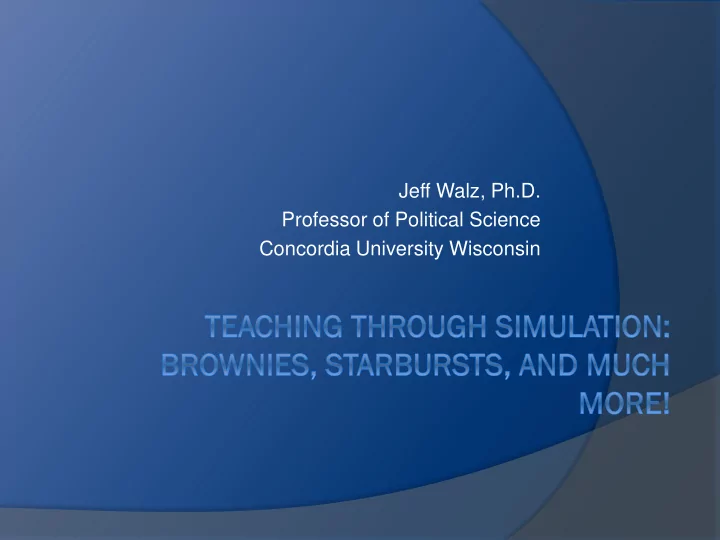

Jeff Walz, Ph.D. Professor of Political Science Concordia University Wisconsin
Cookies for All! Or is this Misleading? Brownie Simulation What is Politics? How Politics and Government Work Lessons about Politics and Government
Simulations Defined Bromley (2013) “Collaborative activities when students take on roles and make decisions accordingly.” A Staple of Political Science courses How useful in other disciplines?
Discussion Outline Types & Sources of Simulations Walz Examples Strengths of Simulations Weaknesses of Simulations Assessment Process Simulations in Your Disciplines: Reflections and Ideas (by table) Q and A
Types of Simulations (based on duration) One class Multiple Class Semester-long Other: Model UN (club or organization)
Sources of Simulations Colleagues Discipline Literature Looking “out the window” for own ideas Use of Technology
Walz Simulations Brownies Alabama Literacy Test Starburst Coalition Balancing the Budget (video clip) 1960 Presidential Debate Presidential Cabinet
Strengths of Simulations Raymond and Usherwood (2013) (and Walz) Fun! Student Engagement Change of Pace Increased Learning Enhanced Student Motivation Peer-to-Peer Insights
Weaknesses of Simulations Raymond and Usherwood (2013) and Bromley (2013) (and Walz) Overused; consider case studies, enhanced lectures, large group discussion, small group work, in-class writing Insufficient Assessment Risk: Will it Work? Planning Time
Assessment Process (based on Raymond and Usherwood 2013) Current: Did the students seem engaged? Did it appear the students learned something? State specific objectives or desired outcomes. Align simulation to assessment regime. Debriefing and feedback to students Big picture: Did it work? Should I keep it? Should I tweak it?
Simulations in Your Disciplines: Reflections and Ideas (by table) Would simulations be feasible in my field? Why or why not? If yes, what resources do I need? Where might I get simulation ideas in my discipline? Other thoughts and observations
Thank you!!
Recommend
More recommend